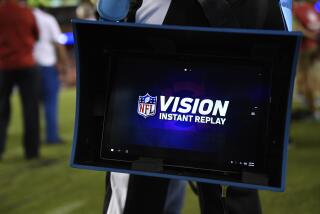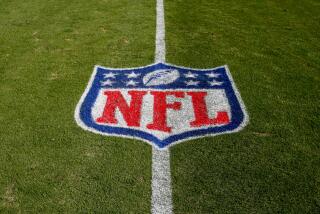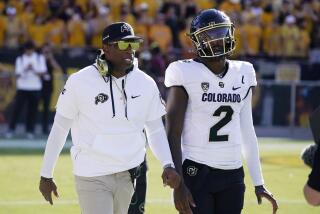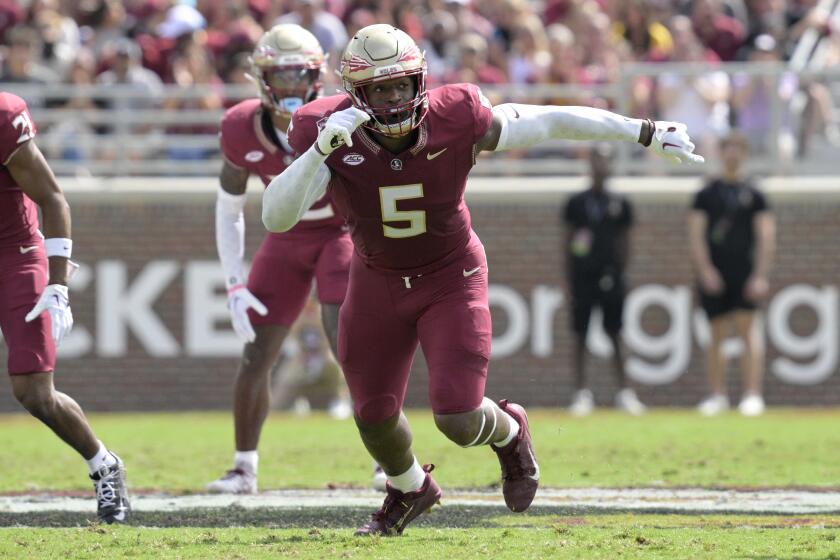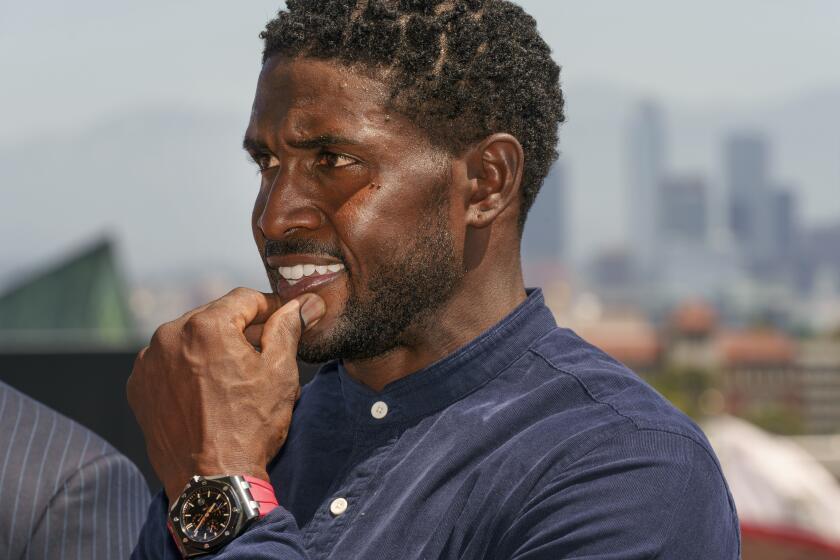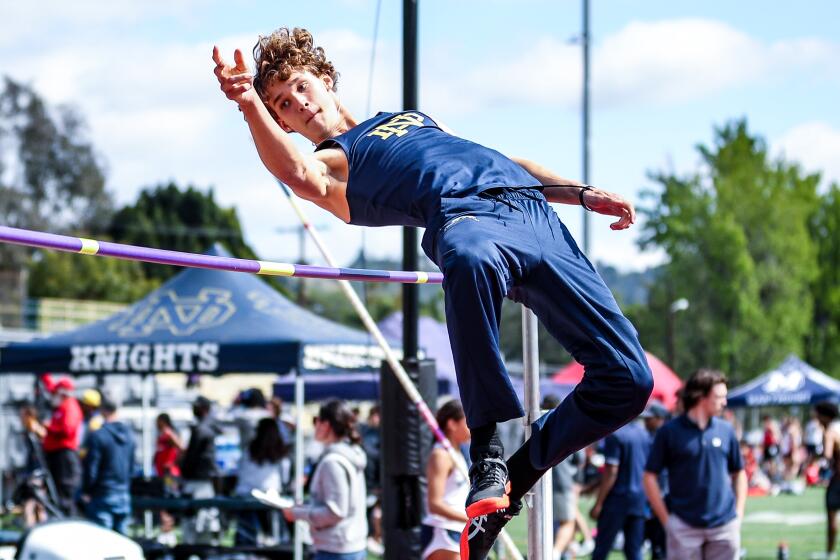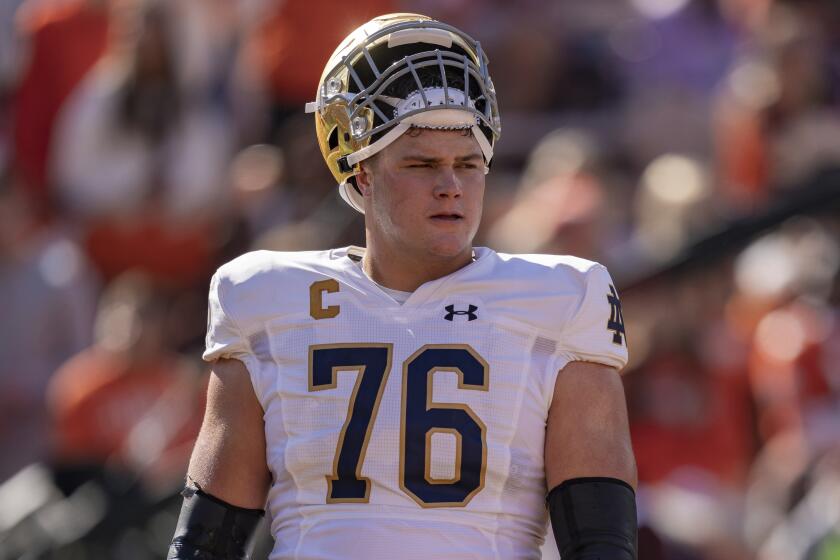Fines, Not Suspensions, Are Needed
The NFL, a league that has a long history of promptly punishing players who get out of line, disciplined Tennessee tackle Albert Haynesworth this week for willfully stomping on the face of an opposing player in Sunday’s Dallas game. But the punishment was wrongly chosen.
It should have been a steep fine instead of a suspension without pay for five games.
In a team game, suspensions hurt teams, often critically. And when it’s the player who is at fault, not the team, it’s the player who should be punished, not the team.
The fine in this case -- a five-game loss of revenue -- ought to have been considerably larger and should not have included loss of playing time.
That might have required a waiver from union leader Gene Upshaw, who heads the NFLPA.
Upshaw, a former lineman and Hall of Famer, understands that suspensions harm teams -- but his problem is that the members of his union strongly favor suspensions over fines.
His role now is to convince the membership that in cases like this, heavy fines are a necessity if suspensions are not.
Fining, in fact, is always the best way of disciplining players in team sports, which is why team owners and their players should commit to few, if any, suspensions and allow the increased the use of fining as the NFL’s main disciplinary weapon.
It should be the main weapon as well in two other kinds of cases:
-- Teams that punish their own players, for almost any reason, should fine them instead of ordering them out of next Sunday’s game, a tactic that only helps the other side win.
-- College teams should also end the practice of suspending players in disciplinary cases. For UCLA to suspend a starter for a game or two --- for any reason --- is counterproductive to its goal: game success.
College people should be able to think up a better disciplinary tactic than that.
__________
Pass-First Bears Win with Sound Strategy
THE 4-0 CHICAGO BEARS, as led by Lovie Smith and his offensive coordinator, Ron Taylor, are among the few pro clubs now playing the game just right. That is, the Bears like to pass aggressively, down the field, on first down. This is typically a running down elsewhere.
Hence the Bears make more first-down yards than other teams, which creates more run-or-pass uncertainties in the minds of their opponents on second down, and leads to more scores and, therefore, more wins.
In a predictable result of their aggressive passing, the Bears have jumped up to first place in the NFC as, most likely, the best team in football.
That seemed evident Sunday night when they won a 37-6 laugher from previously undefeated Seattle.
As underrated quarterback Rex Grossman threw a pair of touchdown passes, the Bears opened a 20-6 halftime lead, then came out passing in the third quarter as if they were behind.
These Bears are an uncommonly well-balanced team -- with a tough defense and a tough runner, Thomas Jones, to match their aggressive passing -- but it is their first-down, attack-pass philosophy that sets them apart.
Against the Seahawks, for instance, Grossman set up one touchdown with two successive bombs. The first was an arcing throw that Bernard Berrian tracked down in Seahawk territory, the second a laser shot to Berrian streaking through the end zone -- a bomb that just missed. But Chicago’s message was clear: We are after you in every situation.
Other teams, after completing a big pass, like to run, apparently feeling that having proved they can pass, they must now prove they can run. The Bears are different.
__________
Fear of Interceptions Hurts NFL
THE SAN DIEGO CHARGERS are still playing the game a more traditional way, which is to say a losing way. This week, for instance, aiming to protect a six-point lead, they ran and ran.
In other words, their coach, Marty Schottenheimer, is continuing a lifelong commitment to taking no chances, a commitment he seems to favor over trying to win.
Again Sunday in Baltimore, the Chargers, with a new quarterback, the talented Philip Rivers, often moved downfield on pass plays -- as they had last year with Drew Brees. But when Schottenheimer authorized few passes through a scoreless second half, Baltimore’s Steve McNair rose up and beat him with 41 seconds to play
Too many other pro clubs have the same play-it-safe policy, for a reason that is probably the same or similar: fear of interceptions.
The Bears, as their 4-0 record suggests, have been showing more spunk.
_______________
The Difference Will Be Made in the Air
THE PHILADELPHIA EAGLES, long the NFC”s only passing team, are on the heels of the NFL’s unbeaten class -- Chicago, Indianapolis and Baltimore -- following a victory Monday night that ended a week of play in which it seemed likely that the undefeated group will shortly be much smaller, if it exists at all.
Donovan McNabb’s runs and passes for Philadelphia (3-1) won Monday night’s game against Green Bay, 31-9, certifying that the 2006 Packers are a clear loser. Their big years seem so long ago.
The Packers have been good for Green Bay, and good for pro football, all this time, but they’ve been struggling this season along with most NFC clubs.
The question in a year like this is always the same. In the remaining games of a parity season, which teams will eventually emerge? The odds favor those who take to the air.
More to Read
Get our high school sports newsletter
Prep Rally is devoted to the SoCal high school sports experience, bringing you scores, stories and a behind-the-scenes look at what makes prep sports so popular.
You may occasionally receive promotional content from the Los Angeles Times.
